考研英语阅读态度题选项归纳
考研备考英语阅读突破——理解作者态度
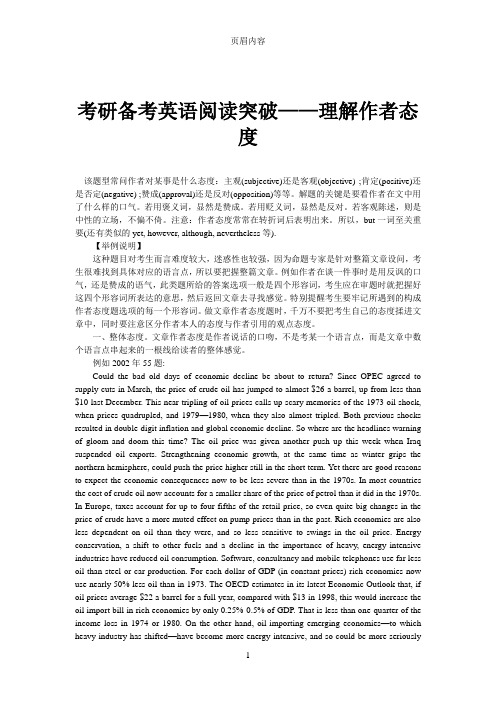
考研备考英语阅读突破——理解作者态度该题型常问作者对某事是什么态度:主观(subjective)还是客观(objective) ;肯定(positive)还是否定(negative) ;赞成(approval)还是反对(opposition)等等。
解题的关键是要看作者在文中用了什么样的口气。
若用褒义词,显然是赞成。
若用贬义词,显然是反对。
若客观陈述,则是中性的立场,不偏不倚。
注意:作者态度常常在转折词后表明出来。
所以,but一词至关重要(还有类似的yet, however, although, nevertheless等).【举例说明】这种题目对考生而言难度较大,迷惑性也较强,因为命题专家是针对整篇文章设问,考生很难找到具体对应的语言点,所以要把握整篇文章。
例如作者在谈一件事时是用反讽的口气,还是赞成的语气,此类题所给的答案选项一般是四个形容词,考生应在审题时就把握好这四个形容词所表达的意思,然后返回文章去寻找感觉。
特别提醒考生要牢记所遇到的构成作者态度题选项的每一个形容词。
做文章作者态度题时,千万不要把考生自己的态度揉进文章中,同时要注意区分作者本人的态度与作者引用的观点态度。
一、整体态度。
文章作者态度是作者说话的口吻,不是考某一个语言点,而是文章中数个语言点串起来的一根线给读者的整体感觉。
例如2002年55题:Could the bad old days of economic decline be about to return? Since OPEC agreed to supply-cuts in March, the price of crude oil has jumped to almost $26 a barrel, up from less than $10 last December. This near-tripling of oil prices calls up scary memories of the 1973 oil shock, when prices quadrupled, and 1979—1980, when they also almost tripled. Both previous shocks resulted in double-digit inflation and global economic decline. So where are the headlines warning of gloom and doom this time? The oil price was given another push up this week when Iraq suspended oil exports. Strengthening economic growth, at the same time as winter grips the northern hemisphere, could push the price higher still in the short term. Yet there are good reasons to expect the economic consequences now to be less severe than in the 1970s. In most countries the cost of crude oil now accounts for a smaller share of the price of petrol than it did in the 1970s. In Europe, taxes account for up to four-fifths of the retail price, so even quite big changes in the price of crude have a more muted effect on pump prices than in the past. Rich economies are also less dependent on oil than they were, and so less sensitive to swings in the oil price. Energy conservation, a shift to other fuels and a decline in the importance of heavy, energy-intensive industries have reduced oil consumption. Software, consultancy and mobile telephones use far less oil than steel or car production. For each dollar of GDP (in constant prices) rich economies now use nearly 50% less oil than in 1973. The OECD estimates in its latest Economic Outlook that, if oil prices average $22 a barrel for a full year, compared with $13 in 1998, this would increase the oil import bill in rich economies by only 0.25%-0.5% of GDP. That is less than one-quarter of the income loss in 1974 or 1980. On the other hand, oil-importing emerging economies—to which heavy industry has shifted—have become more energy-intensive, and so could be more seriously1squeezed. One more reason not to lose sleep over the rise in oil prices is that, unlike the rises in the 1970s, it has not occurred against the backbone of general commodity-price inflation and global excess demand. A sizable portion of the world is only just emerging from economic decline. The Economist’s commodity price index is broadly unchanging from a year ago. In 1973 commodity prices jumped by 70% and in 1979 by almost 30%.From the text we can see that the writer seems.[A] optimistic[B] sensitive[C] gloomy[D] scared本段开头用设问句引出问题,再通过严谨地分析,结合数字的对比,得出乐观的结论。
考研英语阅读理解考试题和答案解析二
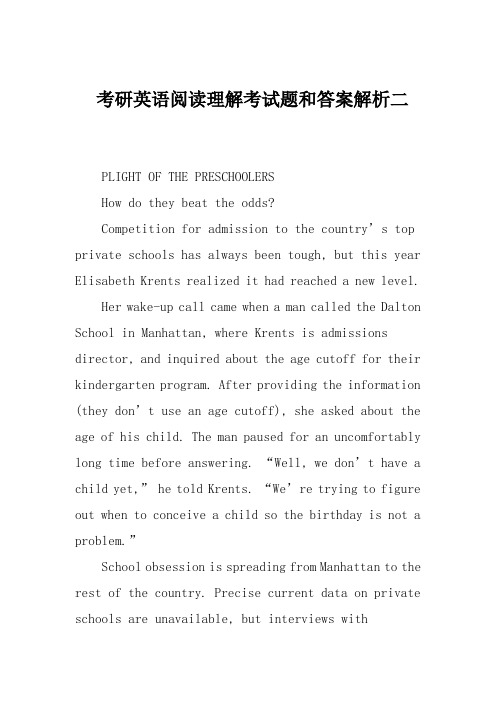
考研英语阅读理解考试题和答案解析二PLIGHT OF THE PRESCHOOLERSHow do they beat the odds?Competition for admission to the country’s top private schools has always been tough, but this year Elisabeth Krents realized it had reached a new level.Her wake-up call came when a man called the Dalton School in Manhattan, where Krents is admissions director, and inquired about the age cutoff for their kindergarten program. After providing the information (they don’t use an age cutoff), she asked about the age of his child. The man paused for an uncomfortably long time before answering. “Well, we don’t have a child yet,” he told Krents. “We’re trying to figure out when to conceive a child so the birthday is not a problem.”School obsession is spreading from Manhattan to the rest of the country. Precise current data on private schools are unavailable, but interviews withrepresentatives of independent and religious schools all told the same story: a glut of applicants, higher rejection rates. “We have people calling u s for spots two years down the road,” said Marilyn Collins of the Seven Hills School in Cincinnati. “We have grandparents calling for pregnant daughters.”Public-opinion poll after poll indicates that Americans’ No. 1 concern is education. Now that the long economic boom has given parents more disposable income, many are turning to private schools, even at price tags of well over $10,000 a year. “We’re getting applicants from a broader area, geographically, than we ever have in the past,” said Betsy Haug h of the Latin School of Chicago, which experienced a 20 percent increase in applications this year.The problem for the applicants is that while demand has increased, supply has not. “Every year, there are a few children who do not find places, but this year, for the first time that I know of, there are a significant number of children who don’t have places,” said Krents, who also heads a private-school admissions group in New York.So what can parents do to give their 4-year-old an edge? Schools know there is no foolproof way to pick a class when children are so young. Many schools give preference to siblings or alumni children.Some use lotteries. But most rely on a mix of subjective and objective measures: tests that at best identify developmental maturity and cognitive potential, interviews with parents and observation of applicants in classroom settings. They also want a diverse mix. Children may end up on a waiting list simply because their birthdays fall at the wrong time of year, or because too many applicants were boys.The worst thing a parent can do is to pressure preschoolers to perform--for example, by pushing them to read or do math exercises before they’re ready. Instead, the experts say, parents should take a breath and look for alternatives. Another year in preschool may be all that’s needed. Parents, meanwhile, may need a more open mind about relatively unknown private schools--or about magnet schools in the public system. There’s no sign of the private-school boom letting up. Dal ton’s spring tours, for early birds interested inthe 2001-2002 school year, are filled. The wait list? Forget it. That’s closed, too.By Pat Wingert Newsweek; 05/15/2000, Vol. 135 Issue 20, p76, 2/3p, 1c注 (1) :本文选自 Newsweek , 05/15/2000, p761.The author uses the examples to show __________.[A]the concern of Americans[B]the charm of the private schools[C]the fierce situation for preschoolers[D]the economic situation of American families2.What is implied in Paragraph 4?[A]The harsh way of forming a class.[B]The high expectation of the parents.[C]The wise selection of the school.[D]The difficulty of getting enrolled.3.The author ’ s attitude toward this event is __________.[A]indifferent[B]apprehensive[C]supportive[D]indignant4.Instead of giving their children great pressureto outperform, the parents should ______.[A]avoid the competition and wait for another year[B]give up their first choice and go to the unknown school[C]let their children be and do what they want to do[D]deal with the matter more casually and rethink the situation5.The text intends to express _________.[A]the popularity of the private schools[B]parents ’ worry about their children ’ s schooling[C]the plight of the preschoolers[D]the severe competition in going to school篇章剖析本文采用提出问题 --- 分析问题的模式。
考研英语真题阅读理解试题及名师解析(17)

[A] the continuing acquisition.
[B] the growing traffic.
[C] the cheering Wall Street.
[D] the shrinking market.
they do when another railroad is competing for the business.
Shippers who feel they are being overcharged have the right to
appeal to the federal government's Surface Transportation Board for
acquire one another, with Wall Street cheering them on. Consider
the $10.2 billion bid by Norfolk Southern and CSX to acquire
Conrail this year. Conrail's net railway operating income in 1996
rate relief, but the process is expensive, time consuming, and will
work only in truly extreme cases.
Railroads justify rate discrimination against captive shippers
increase their grip on the market.
2020考研英语一真题 阅读真题及解析

Text 1A group of labour MPs, among them Yvette Cooper, are bringing in the new year with a call to institute a UK "town of culture" award. The proposal is that it should sit alongside the existing city of culture title, which was held by Hull in 2017 and has been awarded to Coventry for zozl. Cooper and her colleagues argue that the success of the crown for Hull, where it brought in E220m of investment and an avalache of arts, out not to be confined to cities. Britain' town, it is true are not prevented from applying, but they generally lack the resources to put together a bit to beat their bigger competitions. A town of culture award could, it is argued, become an annual event, attracting funding and creating jobs.Some might see the proposal as a boo by prize for the fact that Britain is no longer be able to apply for the much more prestigious title of European capital of culture, a sought-after award bagged by Glasgow in 1990 and Livorpool in 2008. A cynic might speculate that the UK is on the verge of disappearing into an endless fever of self-celebration in its desperation to reinvent itself for, the post-Brexit world: after town of culture, who knows that will follow- village of culture ? Suburb of culture? Hamlet of culture?It is also wise to recall that such titles are not a cure-all. A badly run "year of culture" washes in and out of a place like the tide, bringing prominence for a spell but leaving no lasting benefits to the community . The really successful holders of such titles are those that do a great deal more than fill hotel bedrooms and bring in high-profile arts events and good press for a year. They transform the aspirations of the people who live there; they nudge the self image of the city into a bolder and more optimistic light.It is hard to get right, and requires a remarkable degree of vision, as well as cooperation between city authorities, the private sector, community groups and cultural organizations. But it can be done : Glasgow' s year as European capital of culture can certainly be seen as one of complex series of factors that have turned the city into the power of art, music and theatre that it remains today.A "town of culture" could be not just about the arts but about honouring a town'speculiarities-helping sustain its high street, supporting local facilities and above all celebrating its people and turn it into action.21. Cooper and her colleagues argue that a "town of culture" award could________[A] consolidate the town-city ties in Britain.[B] promote cooperation among Britain's towns.[C] increase the economic strength of Britain's towns.[D] focus Britain's limited resources on cultural events.22. According to Paragraph 2, the proposal might be regarded by some as________[A] a sensible compromise.[B] a self-deceiving attempt.[C] an eye-catching bonus.[D] an inaccessible target.23. The author suggests that a title holder is successful only if it________[A] endeavours to maintain its image.[B] meets the aspirations of its people.[C] brings its local arts to prominence.D] commits to its long-term growth.24. Glasgow is mentioned in Paragraph 3 to present________[A] a contrasting case.[B] a supporting example.[C] a background story,[D] a related topic.25. What is the author's attitude towards the proposal ?[A] Skeptical[B] Objective[C] Favourable[D] Critical21 C increase the economic strength of Britain’s towns这道题是细节题。
考研英语阅读理解试题及名师解析(15)
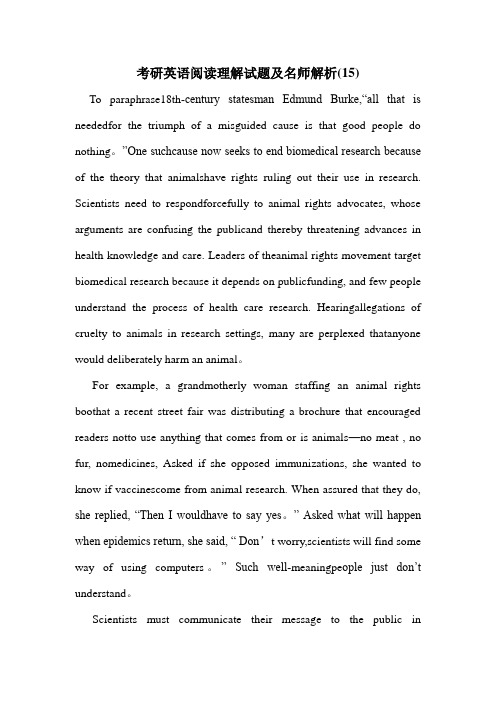
考研英语阅读理解试题及名师解析(15) To paraphrase18th-century statesman Edmund Burke,“all that is neededfor the triumph of a misguided cause is that good people do nothing。
”One suchcause now seeks to end biomedical research because of the theory that animalshave rights ruling out their use in research. Scientists need to respondforcefully to animal rights advocates, whose arguments are confusing the publicand thereby threatening advances in health knowledge and care. Leaders of theanimal rights movement target biomedical research because it depends on publicfunding, and few people understand the process of health care research. Hearingallegations of cruelty to animals in research settings, many are perplexed thatanyone would deliberately harm an animal。
For example, a grandmotherly woman staffing an animal rights boothat a recent street fair was distributing a brochure that encouraged readers notto use anything that comes from or is animals—no meat , no fur, nomedicines, Asked if she opposed immunizations, she wanted to know if vaccinescome from animal research. When assured that they do, she replied, “Then I wouldhave to say yes。
考研英语阅读常见题型归纳
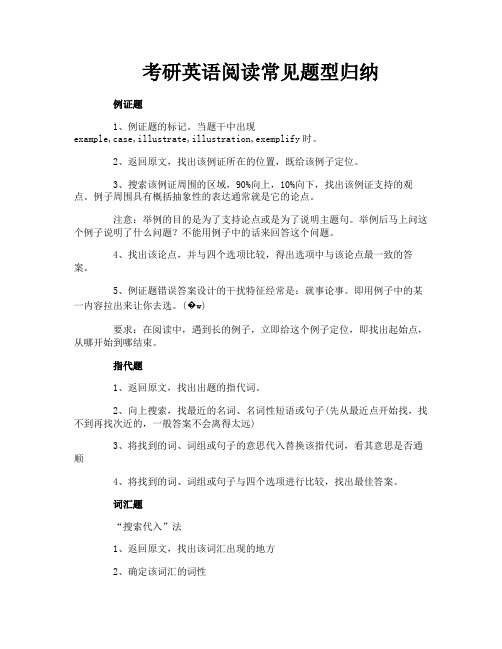
考研英语阅读常见题型归纳例证题1、例证题的标记。
当题干中出现example,case,illustrate,illustration,exemplify时。
2、返回原文,找出该例证所在的位置,既给该例子定位。
3、搜索该例证周围的区域,90%向上,10%向下,找出该例证支持的观点。
例子周围具有概括抽象性的表达通常就是它的论点。
注意:举例的目的是为了支持论点或是为了说明主题句。
举例后马上问这个例子说明了什么问题?不能用例子中的话来回答这个问题。
4、找出该论点,并与四个选项比较,得出选项中与该论点最一致的答案。
5、例证题错误答案设计的干扰特征经常是:就事论事。
即用例子中的某一内容拉出来让你去选。
(�w)要求:在阅读中,遇到长的例子,立即给这个例子定位,即找出起始点,从哪开始到哪结束。
指代题1、返回原文,找出出题的指代词。
2、向上搜索,找最近的名词、名词性短语或句子(先从最近点开始找,找不到再找次近的,一般答案不会离得太远)3、将找到的词、词组或句子的意思代入替换该指代词,看其意思是否通顺4、将找到的词、词组或句子与四个选项进行比较,找出最佳答案。
词汇题“搜索代入”法1、返回原文,找出该词汇出现的地方2、确定该词汇的词性3、从上下文(词汇的前后几句)中找到与所给词汇具有相同词性的词(如一下子找不到就再往上往下找),代入所给词汇在文章中的位置(将之替换)看语义是否合适4、找出选项中与代替词意思相同或相近的选相,即答案注意:a.如果该词汇是简单词汇,则其字面意思必然不是正确答案b.考研阅读不是考察字认识不认识,而是考察是否能根据上下文作出正确的判断。
c.词汇题的正确答案经常蕴藏在原文该词汇出现的附近。
注意不能靠单词词义直接往下推。
d.寻找时要注意同位语、特殊标点(比如分号,分号前后两句话的逻辑关系不是形式上的并列就是语义上的并列,也就是两句话的意思相同,所以可用其中一句话的意思来推测另一句话的意思从而推出所给词汇含义)、定语从句、前后缀,特别要注意寻找时的同性原则。
考研英语阅读理解观点态度题解析
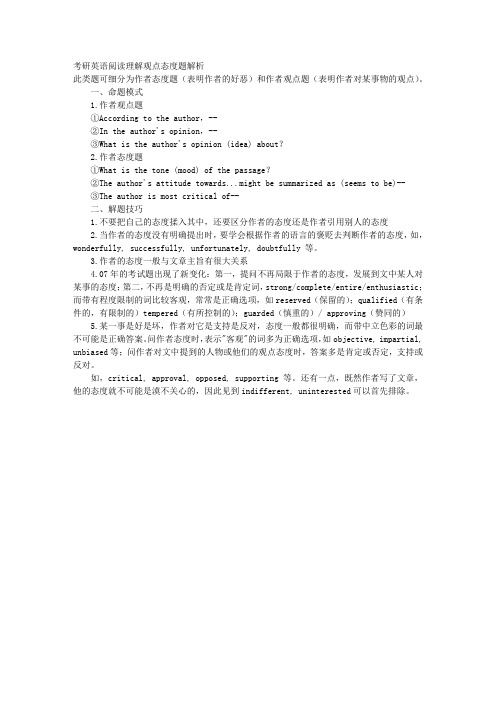
考研英语阅读理解观点态度题解析此类题可细分为作者态度题(表明作者的好恶)和作者观点题(表明作者对某事物的观点)。
一、命题模式1.作者观点题①According to the author,--②In the author's opinion,--③What is the author's opinion (idea) about?2.作者态度题①What is the tone (mood) of the passage?②The author's attitude towards...might be summarized as (seems to be)--③The author is most critical of--二、解题技巧1.不要把自己的态度揉入其中,还要区分作者的态度还是作者引用别人的态度2.当作者的态度没有明确提出时,要学会根据作者的语言的褒贬去判断作者的态度,如,wonderfully, successfully, unfortunately, doubtfully 等。
3.作者的态度一般与文章主旨有很大关系4.07年的考试题出现了新变化:第一,提问不再局限于作者的态度,发展到文中某人对某事的态度;第二,不再是明确的否定或是肯定词,strong/complete/entire/enthusiastic;而带有程度限制的词比较客观,常常是正确选项,如reserved(保留的);qualified(有条件的,有限制的)tempered(有所控制的);guarded(慎重的)/ approving(赞同的)5.某一事是好是坏,作者对它是支持是反对,态度一般都很明确,而带中立色彩的词最不可能是正确答案。
问作者态度时,表示"客观"的词多为正确选项,如objective, impartial, unbiased等;问作者对文中提到的人物或他们的观点态度时,答案多是肯定或否定,支持或反对。
206考研英语(一二)阅读理解态度题分析

2016考研:英语(一、二)阅读理解态度题分析考研英语阅读不管是英语(一)还是(二),每年都会有考察作者态度题。
英语(二)考察的第6个能力是理解作者的意图、观点或态度。
那下面我们就来谈谈如何解态度题。
首先,要学会识别态度题。
态度的标志是含有attitude或者是the author believes/seems/considers/regards等等。
选项的特征是opposition反对、suspicion怀疑的、pessimistic悲观的、approval支持、impartial公平的、objective客观的、sensitive敏感的、不能选的是biased有偏见的、puzzling迷惑的、subjective主观的、indifference冷漠。
第二,作者态度只分为三大类。
除了这3类没有任何其他态度。
如果4个选项中有2个或以上同类的选项,那肯定是错的。
正确的答案只有一个。
这三类是1)支持,赞同和乐观;2)客观,中立和3)反对,批评,怀疑和悲观。
漠不关心,令人迷惑的,有偏见的这些都不能做正确的选项。
第三,从文章中识别作者态度有以下方法:1)当没有明确作者态度的词或句子时,要特别敏锐的定位带有褒贬义或含有感情色彩的词,尤其是出现在中心句或文章主线当中如fortunately, excessively, too many一定要划出来。
2)要特别注意作者的例子,当没有找到作者态度的时候,注意作者为了表达态度的例子。
如果正反都出现,那就是中立的态度。
3)串线法,认真读首段和各段首尾句和转折处。
这样从整体上看谋篇。
能很好的看到作者的态度。
第四,要特别注意的是,最近几年的出题趋势。
1)开始不仅仅考察作者的态度,还开始考察文中某个人观点和态度是什么。
2)选项开始出现不再是态度明确的肯定或否定的词,而改为带有程度限制的词语。
比如reserved(有保留的),tempered(温和的,缓和的)因为持有保留态度的观点比较客观。
考研英语阅读态度题方法讲解.doc

考研英语阅读态度题方法讲解考研英语阅读是整体试卷分数最重的局部,历年都是兵家必争之地,也是让很多考生很“忧愁”的题型之一。
下面是为大家带来的考研英语阅读态度题方法讲解,欢送阅读。
通过对考研英语阅读文章题干的观察分类态度题题干特点如下,当题干中出现attitude,the author...,the writer (i)the author’s opinion,feel about等,即可判断该题干为态度题,见历年真题题干如下:1.In the author’s opinion, the absorption of immigrants into American society is .(xx Text 1)2.From the text we can conclude that the author .(xx Text 2)3.What is the author’s attitude towards IQ test? (xx text 2)xx Text 4 66.xx Text 3 55.xx Text 1 25.xx Text 2 30.xx Text 2 30.*以xx Text 2 30题为例进展分析*:What is the author’s attitude towards IQ test? (xx text 2)(文章中以莎凡的例子引出文章论述要点,即智力测验不能够说明人的智力上下——二段1句,在起承转合的合的最后一段,作者指出了智力测验的弊端,不能评估创造力和实践能力,压力下不能评估领导能力,通过串线法把握文章脉络,可见作者是持疑心态度的。
)[A] Supportive. 反向干扰[B] Skeptical.[C] Impartial. 作者侧重讨论缺乏之处,不是中立的态度,中立态度一般放在文中既讨论有利之处又讨论弊端的文章中[D] Biased. 文中质疑智力测验有理有据,所以并不能够说是偏见。
考研英语阅读态度题选项归纳

一.情感态度题的词语选项一般可以分为以下几种:1.褒义词impartial,公正的, rewarding有回报的, appreciative 欣赏的,positive 肯定的, 积极的, optimistic 乐观的, useful 有用的, 有益的, admiring 赞赏的, 钦佩的, interesting 有趣的, instructive 有益的, 教育性的, enthusiastic 热心的, 热情的, supportive 支持的, support支持, approval 赞成, 承认, approving 满意的, confident 自信的, 确信的, impressed 留下印象的, reverent 尊敬的, polite 有礼貌的, 文雅的;2.贬义词Apprehensive担忧的, hostile 敌对的, dubious怀疑的,intolerant 不能容忍的, negative 否定的, 消极的, pessimistic 悲观的, 厌世的, subjective 主观的, 个人的, disappointed 失望的, frustrated 失败的, 落空的, critical 批评的, questioning 质疑的, doubtful 可疑的, 不确的, compromising 妥协的, dissatisfied 不满意的, 不高兴的, biased 有偏见的, satirical 讽刺的, puzzling 迷惑的, suspicious 怀疑的, gloomy 令人沮丧的, scared 恐惧的, cynical 愤世嫉俗的, oppose 反对, opposition 反对, disgust 令人反感, disgusting 令人厌恶的, worried 闷闷不乐的, depressed 沮丧的, contemptuous 轻蔑的, 侮辱的, arbitrary/opinionated 武断的 ;3.中性词analytical 分析的,apathetic 缺乏兴趣的,concerned 关心的, cautious 谨慎的, 小心的, neutral 中性的,objective 客观的, impartial 公平的, 不偏不倚的, indifferent 无关紧要的, impassive 冷漠的, detached 超然的,不偏不倚的, unconcerned 不关心的, uninterested 不感兴趣的, , humorous 滑稽的, 诙谐的, , disinterested 无私的, sensitive 敏感的, factual 事实的, 实际的, informative 提供资讯的, persuasive 说服的, personal 个人的,, formal 正式的, informal 非正式的, casual 偶然的,二.情感态度题常见出题位置1.直接表达作者或者其他人态度的句子;2.一些感情色彩较浓的词语,尤其是形容词、动词和副词等;3.首段和末段;4.出现转折的地方,如nevertheless, however, but, yet等;5.文章中一些情态动词后面的内容,这些情态动词有should, shouldn’t, must, mustn’t等;三.情感态度题正确答案选项的特点1.很多情况下,作者只是在客观描述一种现象或是一个观点,所以objective作为正确选项的频率极高;2.一般来说,indifferent不会正确选项,因为作者如果对一个事件漠不关心、就不会专门撰文;另外, 向cynical, disgust, desperate等词语如果出现也不会是正确选项,因为一般考研阅读理解所选的文章不会带有如此强烈的情感,如谩骂、攻击等;3.如果作者开篇就提出了一个观点,而全文中有没有转折和对比的内容,一般来说作者对这个观点持支持态度;4.如果作者开篇提出一个观点或者引述了别人的观点,而后文出现重要的转折,对上述观点进行批评后者否定,那么作者自己的观点往往与开头提出的观点相反; 5.如果选项中出现了一对反义词,那么正确答案往往是这对反义词中的一个,考生可以忽略其余两个选项;6.总结历年的文章,我们发现在关于社会科学和人文科学的文章中,一般来说如果作者都会有支持的态度;在关于自然科学的文章中,作者的态度则经常是objective, analytical等;四.情感态度题干扰答案选项的特点1.选项没有体现作者的观点,甚至是相反的意思;2.选项中张冠李戴,把别人的观点放到了作者头上,或者把作者的观点放到了别人的头上,要加以区分;3.上文中提到的indifferent 及其同义词和近义词等,以及包含强烈情感的词语;五.情感态度题解题方法1.找到直接表述作者态度的句子,对应相应的选项;2.如果没有明确表述态度的句子,则从文章的字里行间把握文章的整体基调; 3.注意不要混淆自己的态度和作者的态度,也不要混淆作者的态度和文中其他人的态度;。
考研英语真题阅读理解试题及名师解析(15)
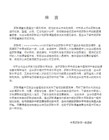
29. The author believes that, in face of
the challenge from animal rights advocates, scientists
should
[A] communicate more with the
public.
understand.
Scientists must communicate their
message to the public in a compassionate, understandable way-in
human terms, not in the language of molecular biology. We need to
[B] criticize the misguided cause of
animal rights. 批评被误导的动物权利事业。
[C] warn of the doom of biomedical
research. 警告生物医学研究的厄运。
[D] show the triumph of the animal
care. Finally, because the ultimate stakeholders are patients, the
health research community should actively recruit to its cause not
only well-known personalities such as Stephen Cooper, who has made
that comes from or is animals-no meat , no fur, no medicines, Asked
2023年考研英语阅读态度题选项归纳

一.情感态度题旳词语选项一般可以分为如下几种:1.褒义词impartial,(公正旳), rewarding(有回报旳), appreciative (欣赏旳),positive (肯定旳, 积极旳), optimistic (乐观旳), useful (有用旳, 有益旳), admiring (赞赏旳, 钦佩旳), interesting (有趣旳), instructive (有益旳, 教育性旳), enthusiastic (热心旳, 热情旳), supportive (支持旳), support(支持), approval (赞成, 承认), approving (满意旳), confident (自信旳, 确信旳), impressed (留下印象旳), reverent (尊敬旳), polite (有礼貌旳, 文雅旳)。
2.贬义词Apprehensive(担忧旳), hostile (敌对旳), dubious(怀疑旳),intolerant (不能容忍旳), negative (否认旳, 消极旳), pessimistic (消极旳, 厌世旳), subjective (主观旳, 个人旳), disappointed (失望旳), frustrated (失败旳, 落空旳), critical (批评旳), questioning (质疑旳), doubtful (可疑旳, 不确旳), compromising (妥协旳), dissatisfied (不满意旳, 不快乐旳), biased (有偏见旳), satirical (挖苦旳), puzzling (困惑旳), suspicious (怀疑旳), gloomy (令人沮丧旳), scared (恐惊旳), cynical (愤世嫉俗旳), oppose (反对), opposition (反对), disgust (令人反感), disgusting (令人厌恶旳), worried (闷闷不乐旳), depressed (沮丧旳), contemptuous (轻蔑旳, 欺侮旳), arbitrary/opinionated (武断旳) 。
考研《英语二》答案:阅读理解

考研《英语二》答案:阅读理解Part AText 121、【答案】B A special tour【解析】细节题。
答案定位在第二段的“it is far better to spend money on experiences…like interesting trips…”,意思是“花钱消费在经历方面更好……,比如说有趣的旅行……”,由此可以得知答案是B选项“一场特别的旅行”。
22、【答案】A critical【解析】观点态度题。
答案定位在第三段的“so mething the average American spends a whopping two months a year doing, and is hardly jollier for it”,意思是“普通美国人一年花两个月的时间看电视,并且看电视几乎不可能更愉快”,因此可以得知作者对于看电视的态度是A选项“批判的”。
23、【答案】D rarity generally increases pleasure【解析】观点例证题。
答案定位在第三段,文章中提到Mc Rib这个例子,用这个例子证明的论点是“luxuries are most enjoyable when they are consumed sparingly”,大意是“有节制地消费奢侈品最令人愉悦”,D选项正是这句论点句的同义替换。
24、【答案】B may prove to be a worthwhile purchase【解析】细节题。
答案定位在最后一段的最后一句“most people will come away from this book believing it was money well spent”,大意是“大多数人看完这本书后,认为物有所值”,因此可以推知B选项是正确答案。
25、【答案】A balance feeling good and spending money【解析】主旨题。
考研英语阅读:作者态度题

作者态度题每年都会涉及,题量不会很大,基本每次一题。
但能否把握作者态度对于文章的整体理解是至关重要的。
1.标志:attitude2.作者的态度只分为三种:支持或赞同;中立或客观;怀疑、批评或反对3. 判定作者态度的方法A)寻找带有作者强烈感情色彩的名词、动词、形容词或者副词来判定作者态度。
如2009年大纲样题(1996年真题)“The growth of the limited liability company and municipal business had important consequences. Such large, impersonal manipulation of capital and industry greatly increased the numbers and importance of shareholders as a class, an element in national life representing irresponsible (不负责任的,明显是一个贬义词,作者就是批判股东的)wealth detached from the land and the duties of the landowners; and almost equally detached from the responsible management of business.”“Fortunately, (幸运的,明显后面连接的是作者支持的,即行业公会起了一个好的作用)however, the increasing power and organisation of the trade unions, at least in all skilled trades, enabled the workmen to meet on equal terms the managers of the companies who employed them.”61. According of the passage, all of the following are true except that ________.[A] the shareholders were unaware of the needs of the workers[B] the old firm owners had a better understanding of their workers[C] the limited liability companies were too large to run smoothly[D] the trade unions seemed to play a positive role (行业公会扮演了一个积极的角色)62. The author is most critical of ________.[A] family firm owners[B] landowners[C] managers[D] shareholders (批判股东)B)段首句中含有“but, yet, however, in fact”类表示强转折关系的词时,这句话通常表征作者观点。
考研备考英语二阅读态度题解题原则
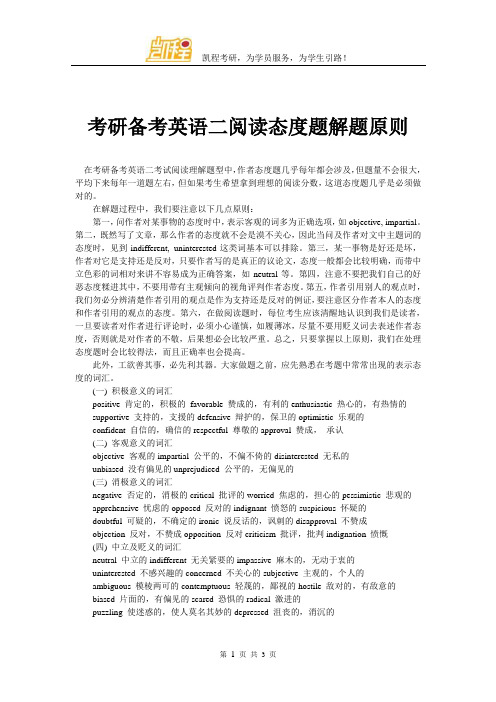
考研备考英语二阅读态度题解题原则在考研备考英语二考试阅读理解题型中,作者态度题几乎每年都会涉及,但题量不会很大,平均下来每年一道题左右,但如果考生希望拿到理想的阅读分数,这道态度题几乎是必须做对的。
在解题过程中,我们要注意以下几点原则:第一,问作者对某事物的态度时中,表示客观的词多为正确选项,如objective, impartial。
第二,既然写了文章,那么作者的态度就不会是漠不关心,因此当问及作者对文中主题词的态度时,见到indifferent, uninterested这类词基本可以排除。
第三,某一事物是好还是坏,作者对它是支持还是反对,只要作者写的是真正的议论文,态度一般都会比较明确,而带中立色彩的词相对来讲不容易成为正确答案,如neutral等。
第四,注意不要把我们自己的好恶态度糅进其中,不要用带有主观倾向的视角评判作者态度。
第五,作者引用别人的观点时,我们勿必分辨清楚作者引用的观点是作为支持还是反对的例证,要注意区分作者本人的态度和作者引用的观点的态度。
第六,在做阅读题时,每位考生应该清醒地认识到我们是读者,一旦要读者对作者进行评论时,必须小心谨慎,如履薄冰,尽量不要用贬义词去表述作者态度,否则就是对作者的不敬,后果想必会比较严重。
总之,只要掌握以上原则,我们在处理态度题时会比较得法,而且正确率也会提高。
此外,工欲善其事,必先利其器。
大家做题之前,应先熟悉在考题中常常出现的表示态度的词汇。
(一) 积极意义的词汇positive 肯定的,积极的favorable 赞成的,有利的enthusiastic 热心的,有热情的supportive 支持的,支援的defensive 辩护的,保卫的optimistic 乐观的confident 自信的,确信的respectful 尊敬的approval 赞成,承认(二) 客观意义的词汇objective 客观的impartial 公平的,不偏不倚的disinterested 无私的unbiased 没有偏见的unprejudiced 公平的,无偏见的(三) 消极意义的词汇negative 否定的,消极的critical 批评的worried 焦虑的,担心的pessimistic 悲观的apprehensive 忧虑的opposed 反对的indignant 愤怒的suspicious 怀疑的doubtful 可疑的,不确定的ironic 说反话的,讽刺的disapproval 不赞成objection 反对,不赞成opposition 反对criticism 批评,批判indignation 愤慨(四) 中立及贬义的词汇neutral 中立的indifferent 无关紧要的impassive 麻木的,无动于衷的uninterested 不感兴趣的concerned 不关心的subjective 主观的,个人的ambiguous 模棱两可的contemptuous 轻蔑的,鄙视的hostile 敌对的,有敌意的biased 片面的,有偏见的scared 恐惧的radical 激进的puzzling 使迷惑的,使人莫名其妙的depressed 沮丧的,消沉的凯程教育:凯程考研备考成立于2005年,国内首家全日制集训机构考研备考,一直从事高端全日制辅导,由李海洋教授、张鑫教授、卢营教授、王洋教授、杨武金教授、张释然教授、索玉柱教授、方浩教授等一批高级考研备考教研队伍组成,为学员全程高质量授课、答疑、测试、督导、报考指导、方法指导、联系导师、复试等全方位的考研备考服务。
2021考研英语阅读如何解答观点态度题

2021考研英语阅读如何解答观点态度题1. 态度题的识别方式题干中出现attitude或者选项是态度词的表达,例如:27. The author’s attitude toward California’s argument is one of______(2021年 Text 2)[A] tolerance.[B] indifference.[C] disapproval.[D] cautiousness.2. 表示作者的观点态度词正面态度(积极、支持、赞成)Supportive, sympathy, approval,positive, optimistic, hopeful, confident, appreciation反面态度(消极、反对、怀疑)Disapproved, opposed, suspicious, skeptical, doubtful, negative, pessimistic, apprehensive, questionable, critical 客观态度impartial, objective3.不能作为作者的观点态度词(干扰选项)表示情感态度强烈的选项:Enthusiastic, strong, indignation,outrage, desperate, destructive表示冷漠、不关心、不感兴趣、关心、感兴趣的选项:Indifferent, uninterested, unconcerned, detached, sensitive表示歧视偏见不平等的选项:Biased, contemptible, discriminated, prejudiced, scornful, contemptuous 表示迷惑不清楚的选项:Confused, puzzled, gloomy,unclear,uncertain4. 解题步骤过以上的总结发现,态度题的正确答案和错误选项相对来说比较固定,所以这是态度题好做的原因。
考研英语四六级阅读理解作者态度观点信号词寻找以及常见态度词汇集锦附小测试一题

常见观点态度词语小测试:positive favorable(dis)approvalsupportive defensive negativeobjection critical oppositionobjective subjective optimisticindifferent compromising uninterestedquestioning disappointed concernedneutral cautious pessimisticbiased suspicious doubtful态度观点信号词:论点:认为,相信:argue , argument , believe , suppose, think , be convinced that [相信] , hold the belief that … , have a notion that …, view…as , regard….as , see…as, consider….to be, reckon [算作,设想],论据: for example , for instance , specifically, take… as an examplelike , such as … , Imagine …. ,调查研究:investigation , inquiry [hold an inquiry into a case对一个案子进行调查]research, study, survey, report , questionnaire[调查问卷],measurement ,调查研究结果:得出结论:conclude th at … ,come to a conclusion that …. ,draw a conclusion that …表明,发现:show , suggest , demonstrate , manifest [清楚地显示或表示]display, find , find out, discover, reveal , proveindicate, imply,预测、预报、预言:forecast , foretell, foresee, predict表示赞同:agree, appreciate意识到, 懂得, approve赞成、批准, consent to同意表示反对:against , disagree, disapprove, dissent from, object to ,be opposed to反对表示事实:belief , fact , reality, truth表示理论,设想:assumption , theory, hypothesis [假设]表示目的:to do, aim at, for the sake of , for , serve as, in favor of [有利于],for the purpose of, intend to do ,论据中常见专家名称:expert , specialist , professor , associate professor [副教授],sociologist [社会学家],economist, linguist[语言学家],consultant [顾问] psychologist [心理学家],behaviorist [行为学家],philosopher[哲学家] , anthropologist [人类学家],archaeologist [考古学家]逻辑信号词-路标词1,表示因果的原因:后接句子--- Because, since , as , for后接词组--- because of , thanks to由于,多亏, owing to 由于, 因...之缘故, due to , as a result of 作为结果,by/in virtue of [由于]* The movie touched me by virtue of its story.结果:so(that), accordingly[因此];as a result; consequently; for this(that)reason; hence; therefore此外:表因果的特色词汇比如A 是因,B是果:Greenhouse effect is responsible for weather changeA account for / be responsible for BA cause / lead to / result in / bring about / bring on / trigger /give rise to B2,表示转折的“但是,然而”:but , however; yet , nevertheless, whereas“尽管,虽然”:后接句子--- although , though, even though , while ,#notwithstanding后接词组--- despite; in spite of“相反地”:conversely[相反地] ; on the contrary;“另一方面”:on the other hand;3,表示比较的by comparison ; in contrast (相比之下); in the same way; similarly4,表示递进的also; besides; furthermore; in addition; in particular(特别地)more importantly; moreover; What’s more5,表示概括的in brief; in conclusion; in short; in a word , in sum; to sum up; on the whole , to conclude6.表示并列:and , or , at the same time, meanwhile , as well as一、态度词汇总1.积极:approving 赞许的,,optimistic 乐观的, sympathetic 同情的, consent 赞成2.消极:negative否定的,消极的,反面的,pessimistic 悲观的,apprehensive 忧虑的,reserved 有保留的,内向的,arbitrary武断的, biased有偏见的,偏心的, partial 不公平的, critical 持批评态度的, depressing 令人沮丧的,disappointing令人失望的, doubtful怀疑的,object反对, be opposed to/opposing反对的, scared惊恐的,panick恐慌, sensitive敏感的,subjective主观的, suspicious怀疑的3.中性:objective 客观的,impartial 公平的, unbiased公正的4. 情绪:anger愤怒, indignant 愤怒的r, happy高兴的, contempt轻视, gloomy沮丧的5.其它:surprized惊奇的, amazed惊奇的, puzzled迷惑的, ambiguous模棱两可的, neutral 中立的,indifferent漠不关心的, subjective 主观的6.对态度的修饰词:reserved有保留的, cautiously谨慎地, enthusiatic热烈的, strong强烈的, radical激进的二、态度词分析1.可能的态度:考研阅读考的的态度有两种,一种是作者,另一是非作者的其它人。
考研英语真题阅读理解试题及名师解析(十八)

It is said that in England death is pressing, in Canada inevitable and in California optional .Small wonder. Americans’ life expectancy has nearly doubled over the past century. Failing hips can be replaced, clinical depression controlled, cataracts removed in a 30-minute surgical procedure. Such advances offer the aging population a quality of life that was unimaginable when I entered medicine 50 years ago. But not even a great health-care system can cure death—and our failure to confront that reality now threatens this greatness of ours。
Death is normal; we are genetically programmed to disintegrate and perish, even under ideal conditions. We all understand that at some level, yet as medical consumers we treat death as a problem to be solved. Shielded by third-party payers from the cost of our care, we demand everything that can possibly be done for us, even if it's useless. The most obvious example is late-stage cancer care. Physicians—frustrated by their inability to cure the disease and fearing loss of hope in the patient—too often offer aggressive treatment far beyond what is scientifically justified。
考研阅读理解态度题

阅读理解态度题瞬间秒杀技巧在阅读理解的作者态度题中:/如果选项表述的态度过于强烈或过于负面,比如悲观(pessimistic/gloomy)、恐惧(scared)、蔑视/嘲笑(contempt/scornful/disdainful)、绝望(desperate)、有害(harmful/destructive)、自以为是(conceited)、讽刺(sarcastic)等,不是答案。
/如果选项表述困惑(confused/puzzled)、漠不关心(indifference/indifferent)、不确定(uncertain/ambiguous)、犹豫(hesitancy)等,不是答案。
因为作者必须表明一个明确的态度,不能模棱两可。
/如果选项表述偏见(biased),不是答案。
/如果选项表述容忍(tolerant/tolerance/permissive/indulgence),不是答案。
/如果选项表述支持(supportive)、欣赏(appreciation/appreciative)、满意(satisfaction/desirable)、肯定(positive)等,通常不是答案。
/如果选项表述怀疑(suspicion/skeptical/doubtful/questionable)、乐观(optimistic)、同情(sympathy)、客观(objective/impartial)、赞同(approval/consent)等,通常是答案。
(注:此处“怀疑”是针对全文中局部内容的怀疑,如果是针对全文的怀疑,则不是答案)第一/1.客观理性原则某一事物是好是坏,作者对它是支持、反对还是中立,态度一般都非常明确。
问作者对某事物的态度时,表示“客观”的词多为正确选项(事物是客观存在的)。
如objective,impartial,unbiased等。
问作者对其提到的某人的观点的态度时,答案只能是肯定或否定,支持或反对。
考研英语阅读理解例题分析
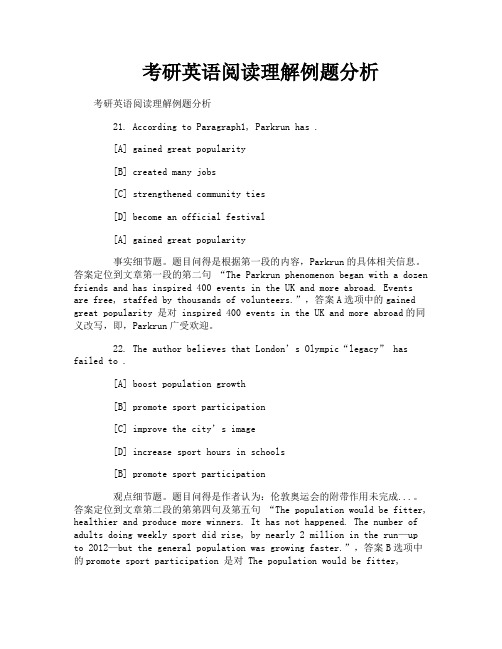
考研英语阅读理解例题分析考研英语阅读理解例题分析21. According to Paragraph1, Parkrun has .[A] gained great popularity[B] created many jobs[C] strengthened community ties[D] become an official festival[A] gained great popularity事实细节题。
题目问得是根据第一段的内容,Parkrun的具体相关信息。
答案定位到文章第一段的第二句“The Parkrun phenomenon began with a dozen friends and has inspired 400 events in the UK and more abroad. Events are free, staffed by thousands of volunteers.”,答案A选项中的gained great popularity 是对 inspired 400 events in the UK and more abroad的同义改写,即,Parkrun广受欢迎。
22. The author believes that London’s Olympic“legacy” has failed to .[A] boost population growth[B] promote sport participation[C] improve the city’s image[D] increase sport hours in schools[B] promote sport participation观点细节题。
题目问得是作者认为:伦敦奥运会的附带作用未完成...。
答案定位到文章第二段的第第四句及第五句“The population would be fitter, healthier and produce more winners. It has not happened. The number of adults doing weekly sport did rise, by nearly 2 million in the run—up to 2012—but the gener al population was growing faster.”,答案B选项中的promote sport participation 是对 The population would be fitter,healthier and produce more winners. It has not happened的同义改写,即,作者认为伦敦奥运会的附带作用未促进民众对于体育运动的参加情况。
- 1、下载文档前请自行甄别文档内容的完整性,平台不提供额外的编辑、内容补充、找答案等附加服务。
- 2、"仅部分预览"的文档,不可在线预览部分如存在完整性等问题,可反馈申请退款(可完整预览的文档不适用该条件!)。
- 3、如文档侵犯您的权益,请联系客服反馈,我们会尽快为您处理(人工客服工作时间:9:00-18:30)。
考研英语阅读态度题选项
归纳
Final approval draft on November 22, 2020
一.情感态度题的词语选项一般可以分为以下几种:
1.褒义词
impartial,(公正的),rewarding(有回报的),appreciative(欣赏的),positive(肯定的,积极的),optimistic(乐观的),useful(有用的,有益的),admiring(赞赏的,钦佩的),interesting(有趣的),instructive(有益的,教育性的),enthusiastic(热心的,热情的),supportive(支持
的),support(支持),approval(赞成,承认),approving(满意的),confident(自信的,确信
的),impressed(留下印象的),reverent(尊敬的),polite(有礼貌的,文雅的)。
2.贬义词
Apprehensive(担忧的),hostile(敌对的),dubious(怀疑的),intolerant(不能容忍的),negative(否定的,消极的),pessimistic(悲观的,厌世的),subjective(主观的,个人的),disappointed(失望的),frustrated(失败的,落空的),critical(批评的),questioning(质疑的),doubtful(可疑的,不确的),compromising(妥协的),dissatisfied(不满意的,不高兴的),biased(有偏见的),satirical(讽刺的),puzzling(迷惑的),suspicious(怀疑的),gloomy(令人沮丧的),scared(恐惧的),cynical(愤世嫉俗的),oppose(反对),opposition(反对),disgust(令人反感),disgusting(令人厌恶的),worried(闷闷不乐的),depressed(沮丧的),contemptuous(轻蔑的,侮辱的),arbitrary/opinionated(武断的)。
3.中性词
analytical(分析的),apathetic(缺乏兴趣的),concerned(关心的),cautious(谨慎的,小心
的),neutral(中性的),objective(客观的),impartial(公平的,不偏不倚的),indifferent(无关紧要的),impassive(冷漠的),detached(超然的,不偏不倚的),unconcerned(不关心的),uninterested(不感兴趣的),,humorous(滑稽的,诙谐的),,disinterested(无私的),sensitive(敏感的),factual(事实的,实际的),informative(提供资讯的),persuasive(说服的),personal(个人的,),formal(正式的),informal(非正式的),casual(偶然的),
二.情感态度题常见出题位置
1.直接表达作者或者其他人态度的句子。
2.一些感情色彩较浓的词语,尤其是形容词、动词和副词等。
3.首段和末段。
4.出现转折的地方,如nevertheless,however,but,yet等。
5.文章中一些情态动词后面的内容,这些情态动词有should,shouldn’t,must,mustn’t等。
三.情感态度题正确答案选项的特点
1.很多情况下,作者只是在客观描述一种现象或是一个观点,所以objective作为正确选项的频率极高。
2.一般来说,indifferent不会正确选项,因为作者如果对一个事件漠不关心、就不会专门撰文。
另外,向cynical,disgust,desperate等词语如果出现也不会是正确选项,因为一般考研阅读理解所选的文章不会带有如此强烈的情感,如谩骂、攻击等。
3.如果作者开篇就提出了一个观点,而全文中有没有转折和对比的内容,一般来说作者对这个观点持支持态度。
4.如果作者开篇提出一个观点或者引述了别人的观点,而后文出现重要的转折,对上述观点进行批评后者否定,那么作者自己的观点往往与开头提出的观点相反。
5.如果选项中出现了一对反义词,那么正确答案往往是这对反义词中的一个,考生可以忽略其余两个选项。
6.总结历年的文章,我们发现在关于社会科学和人文科学的文章中,一般来说如果作者都会有支持的态度;在关于自然科学的文章中,作者的态度则经常是objective,analytical等。
四.情感态度题干扰答案选项的特点
1.选项没有体现作者的观点,甚至是相反的意思。
2.选项中张冠李戴,把别人的观点放到了作者头上,或者把作者的观点放到了别人的头上,要加以区分。
3.上文中提到的indifferent及其同义词和近义词等,以及包含强烈情感的词语。
五.情感态度题解题方法
1.找到直接表述作者态度的句子,对应相应的选项。
2.如果没有明确表述态度的句子,则从文章的字里行间把握文章的整体基调。
3.注意不要混淆自己的态度和作者的态度,也不要混淆作者的态度和文中其他人的态度。
